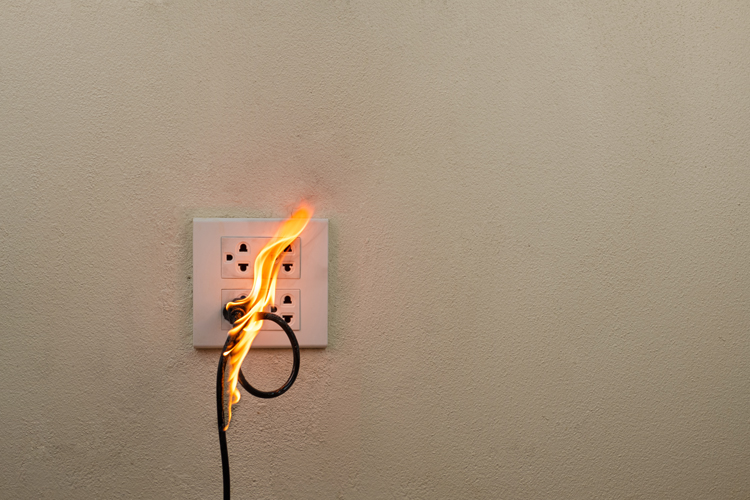
Your home is a place where you make memories and build your life. That’s why it is scary to imagine your home ever suffering from a disaster such as a fire.
A fire can happen anywhere and it’s important to always be prepared for what you would do if you had one in your home. Likewise, it’s just as important to look at all of the ways that you can prevent one from happening in the first place.
When it comes to fire safety, it’s always good to prepare, but it’s better to prevent. Consider these how-to for preventing fires from starting or spreading, and keep these fire safety tips top-of-mind to keep you and your loved ones safe.
People usually say that after a fire it is water damage that is the worst. We are still trying to dry out Windsor Castle.
The first and most important thing you can do is make sure everyone in the household is educated on fire safety measures, including children. Teach your children the dangers of matches, lighters, and other dangerous items. Round up all matches and lighters and store them safely. In case you missed some, ask your children to tell you where any are located throughout your home. Never leave a child alone in a room with a lit candle. Don’t allow teens to have candles in their rooms.
Excess electricity flowing through items in your home can always be a potential fire hazard. Things like computers, TVs, game systems, and a whole lot more that use electricity even when they’re not on. That means they can always experience a surge or they can just overheat and cause a fire. The continuous electricity that’s flowing into them provides them with a source for a fire as well. By unplugging these items when you’re not using them and, therefore, not paying attention to them, you can cut down on your chances of a fire.
Be aware of the capacity of your home's electrical system. Do not overload your circuits. If you have questions about your home's electrical system, you may want to consult a licensed electrician.
Smoke detectors should be tested at least once a month according to your local authority’s guidelines and batteries should be replaced at least once or twice a year. An easy way to remember to do this is to change your smoke detector’s batteries when you change your clocks for daylight savings time.
You’ll also want to do a visual inspection to make sure your alarm indicator is on. This makes sure that both your hard-wired and battery-operated fire alarm is properly connected and the batteries are working.
Replace the entire smoke alarm unit every 10 years or according to the manufacturer’s instructions. A working smoke alarm significantly increases your chances of surviving a deadly home fire.
Keep in mind, every level of the house and every bedroom or sleeping area should have a working smoke detector, including the basement.
Maintain your lawn and keep bushes and trees trimmed. Built-up lawn clippings and dry leaves can create heat and start fires. Things like firewood, leaves, and other flammable materials can easily catch fire from stray ashes or sparks. After a hard day of yardwork, keep the debris a safe distance from the house and dispose of it as soon as possible.
Properly store flammable products like rubbing alcohol, hairspray, and other aerosol cans, gasoline and paint thinner, cooking oil, flour, and nail polish. If they are exposed to a large heat source, they can combust. Keep them away from a potential spark or flame by carefully containing these things in approved containers and keeping them a safe distance away from anything that could react with them.
Perform regular checks around your home and keep up with maintenance. That doesn’t mean you need to dig into the walls in your home to check electrical wires, but you should be checking anything that’s visible. Monitor the wall outlets in your home and pay attention to any that suddenly don’t work. It could be evidence of a problem behind the walls. Look for cords to your electric belongings that are frayed or damaged. These could be signs of problems as well and you don’t want to plug them into your electrical system if you know there’s a problem already.
Replace all worn, old or damaged appliance cords immediately and do not run cords under rugs or furniture.
Most homeowners cook every day. Make sure your stove and oven hood are safely and corrected installed. Tie back long hair and tuck in loose clothing. Always turn it off properly after using the stove and cooktop. Keep loose items (towels, clothes) away from the stove. Keep the area around your stove clean and do not let clutter build up.
If you have children or pets in the home, make sure they are kept well away from the stovetop or oven. Always use the child lock safety feature in the stove if it is built-in available or Several third-party child safety items are also available in the market to make sure children could not able to turn stove it on.
Fire extinguishers are your best defense weapon when a fire breaks out. You want to make sure you have one in every room that is a potential threat, such as the kitchen. Every family member should know how to use an extinguisher so if a fire does happen, it can be put out as fast as possible.
